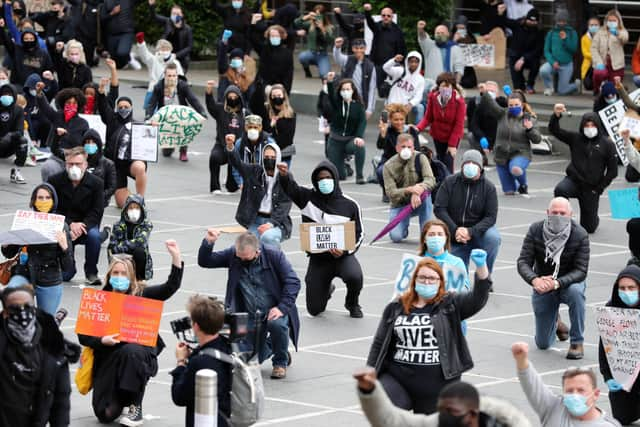Alex Kane: Echo chambers drowning out any prospect of reasoned debate


He wasn’t a ‘political’ figure or spokesman. He didn’t belong to any of the organisations campaigning against racism in America. He didn’t hand out leaflets at weekends or help out in community groups. He didn’t belong to the Democratic Party. He wasn’t a Rosa Parks-type activist, plugging away for years on end to make a difference to his fellow citizens. He would never have been seen at the shoulder of campaigners like Al Sharpton or Jesse Jackson. The vast majority of people in Minneapolis would have passed him by in the street without a second – or even first – glance.
Yet in death, this unremarkable, unknown man has become the catalyst for a wave of anger and protest sweeping across America. Extraordinarily, the anger and protest isn’t confined to America, either. Protesters have been on the streets and in the parks of France, Brazil, India, Spain, Australia and the United Kingdom. Even in Belfast – which doesn’t usually bother all that much with public protests unrelated to its own circumstances – has seen protests.
Advertisement
Hide AdAdvertisement
Hide AdWhat struck me most about the reaction to Floyd’s death was the scale and speed. Nothing appeared to be organised. People, tens upon tens of thousands of them just appeared. Angry people: people who believed that over 50 years after the great civil rights campaigns and legislation of the 1960s they were still not regarded and respected as ‘full citizens’ of the United States. As I say, they would have had no idea who Floyd was, let alone about his prison sentences for violent crime. But that didn’t matter, anyway; because they believed that had Floyd been white he almost certainly would still be alive.


It was their perception of why he died which triggered the protests. And while it is true that a number of groupings have hi-jacked Floyd’s name and death for broader political ends and purposes (including the deliberate use of violence and criminality) we must never lose sight of the fact that the greater number of those who protested did so peacefully and because of their perception about why Floyd had been killed. From their perspective he died because of his colour: and whether he was a good man, with a squeaky clean record, was neither here nor there in their eyes.
Yet it became clear within hours of his death that another narrative would be told about Floyd; a narrative which portrayed him as a man with a violent past who had been detained by the police because he had tried to pass a forged 20 dollar bill. ‘Why so much sympathy for a career criminal’ became a social media mantra. And when the protests expanded into widespread looting, random violence (including pulling people out of cars and beating them) and murder (including a retired police officer) the focus shifted from Floyd’s death to a whole range of other issues, including Trump, populism, legacy and the shape of the United States itself.
There is a blistering pessimistic, yet worryingly accurate quote in the closing passages of Giuseppe Tomas di Lampedusa’s 1958 novel, The Leopard: ‘Nowhere has truth such a short life as in Sicily; a fact has scarcely happened five minutes before its genuine kernel has vanished, been camouflaged, embellished, disfigured, squashed, annihilated by imagination and self-interest; shame, fear, generosity, malice, opportunism, charity, all the passions, good as well as evil, fling themselves onto the act and tear it to pieces; very soon it has vanished altogether.’
Advertisement
Hide AdAdvertisement
Hide AdThe truth has a short life everywhere nowadays. Indeed, I’m not even certain that there is such a thing as truth in politics anymore. There are versions of it. Opposing sides select the bits of value to them and ignore or distort the bits which are of use to their opponents. Populists on both sides do it, using social media platforms to push their instant mash interpretations of events that happened halfway around the world an hour beforehand. What started as a story about George Floyd in Minneapolis has become another story altogether: the story of competing cultures and identities across the world.
For Donald Trump it became about his re-election campaign. Speaking at a rally in Tulsa on Saturday he said: “The unhinged left-wing mob is trying to vandalize our history, desecrate our beautiful monuments, tear down our statues and punish, cancel and persecute anyone who does not conform to their demands for absolute and total control. We’re not conforming.” Not one word, though, about why his country is so divided or why so many people in towns and countries across America had come out in protest at the death of Floyd. Joe Biden, his Democratic opponent, will tell his version of the event for his electoral base.
There are two voices in America at the moment: the voice of Trump supporters who, four years ago, discovered the ‘sheer intoxication that comes from belonging to a crowd that has suddenly found its voice, and which demands to be heard’; and the voice of Black/Coloured America which, echoing the words of the essayist James Baldwin, believes racism ‘compromises, where it does not corrupt, all the American efforts to build a better world.’ Yet the primary purpose of both these voices (as it is with similar voices in other countries which are now reacting to what is happening in America) is to drown each other out and ensure their electoral bases hear only one side of history.
A willingness to listen and to moderate a view used to be regarded as one of the cornerstones of a democratic society. But it looks as though ‘big tent’ politics is now being replaced with echo chambers, never-concede-a-point debate and protect-your-own-side-at-all-costs strategy and campaigning.
Advertisement
Hide AdAdvertisement
Hide AdThe echo chambers claim they are being denied freedom of speech by a mainstream media opposed to them (while claiming nobody listens to that media anyway). Ironically, the voice under greatest threat at the moment – and it’s under threat from both sides – is the voice of those who accept that there are two sides to every story and who want them heard and properly debated.